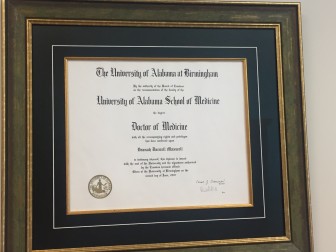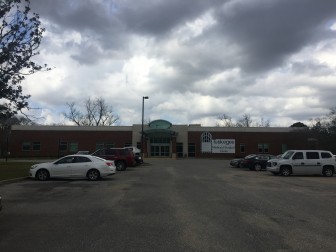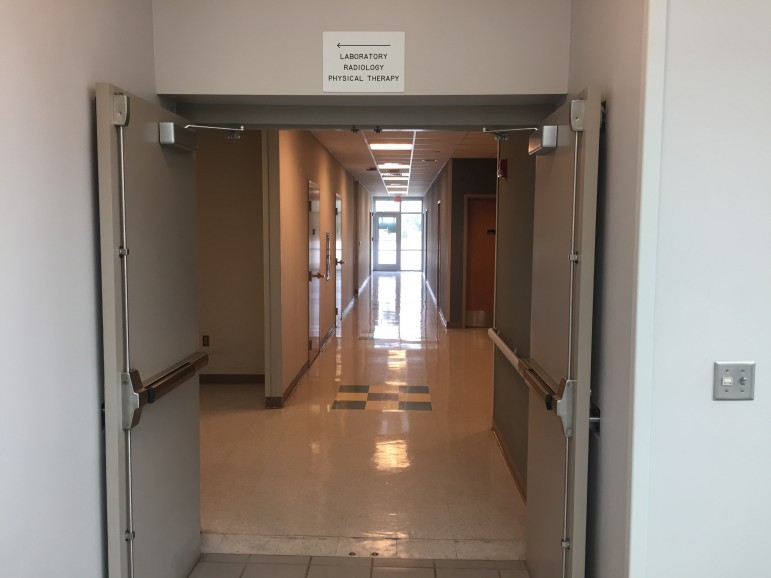Combating Alabama’s Rural Doctor Shortage
Much of the U.S. is already facing doctor shortages, and they’re projected to get worse. Alabama has the ninth-lowest number of doctors per person. And that number is even lower in rural areas. The state health department says most of Alabama faces a lack of primary-care. But there’s a University of Alabama program that’s been grooming doctors from rural areas so they can bring their skills home.
Dr. Deanah Maxwell did just that. It’s a typically busy day at Tuskegee Medical and Surgical Center. Maxwell is examining 96-year-old Meloneze Robinson, (who incidentally once patented a surgical tool and took care of inventor George Washington Carver).
It’s not the first time she and Dr. Maxwell have met. Maxwell grew up in Tuskegee. Robinson and Maxwell go to the same church, and Robinson has known her doctor since she was born. It’s the same with Robinson’s daughter-in-law Sheryl Knight, who brought her in for her checkup.
“It’s wonderful,” says Knight. “Small town – we all have been here … all of her life I’ve been around her. And that would help any small town, because everybody needs some close medical attention. And you don’t need to have to go 30, 40, 50, a hundred miles away just to see a doctor.”
Pretty much the whole community knows Dr. Maxwell. And when you flip that around, Dr. Maxwell knows the community. She says that makes her a better doctor.
“I know when certain people have a sore throat, they can’t sing in the choir on Sunday,” she says. “When people come in and say, ‘hey I’m just not feeling well,’ I can see that there’s been a change from the person I used to know. You know people’s personalities. You know what they’re going to do; you know what they’re not going to do. And you have the benefit of, ‘let me see how I can get this to be important to them.’”
Maxwell, incoming president of the Alabama Academy of Family Physicians, came up through the University of Alabama’s Rural Health Leaders Pipeline. Dr. John Wheat founded the program and ran it for almost three decades. He worked to attract and train doctors like Maxwell, despite rural areas’ lower pay, fewer amenities, and the “bright-lights-big-city” effect:
“Much of the medical students that are produced in this state, these people are coming from urban backgrounds,” says Wheat. “Some people even use the word ‘metrocentricity.’ So when they get ready to become a physician, they tend to look to areas that promote their values.”
Which leaves Alabama with even worse doctor shortages than the rest of the country. And rural Alabama has about half the doctors per person as its cities do.
But the UA pipeline program — really a collection of several programs with similar goals — is fighting that with a comprehensive, long-term approach. It includes outreach to rural elementary and middle schools to get young kids interested in health careers; a five-year rural medical education program spanning the last year of college or grad school through med school; and, a taste of pre-med college life.
“The summer after my junior year of high school, we went up to Tuscaloosa,” says Maxwell. “It was a residential program, so we stayed on campus, got campus life experience. It really let us know what we needed to get into medical school, what types of grades we needed.”
She says it was a rude awakening, coming from schools without many advanced courses, but it helped her “catch up” before gaps in her learning caught up with her.
“One of the classes we took was a college chemistry class, and that hurt my feelings. But it was a good experience because I took it when it wasn’t going to count. A lot of times people get that information when they’re sophomores in college, and it’s too late. The time for them to have these thoughts is not two years from medical school.”
The program seems to be working. Wheat says it’s produced 139 physicians since 2001, and an independent review showed those physicians are far more likely to become family doctors and practice in rural Alabama.
And Wheat says those “home-grown” caregivers are vital.
“Having an individual close to you, that’s convenient to you, who understands you, who understands your family, who understands the occupation you’re in, the risks that you’re running, that is a great resource.”
Back at Tuskegee Medical and Surgical Center, Maxwell’s patient Meloneze Robinson agrees.
“She’s beautiful. She’s solving the problem.”
She’s certainly making a dent … in Tuskegee.
Parents, are you sure your kid’s car seat is installed right? Here’s how to know
In this visual guide, certified car seat experts walk through common installation mistakes and how to fix them. Learn what a secure car seat base and a tightly fastened tether look like and more.
Trump announces ‘major combat operations’ in Iran
Israel and the U.S. have launched strikes against Iran, with explosions reported in Tehran and air raid sirens sounding across Israel.
Trump says he is ‘not happy’ with the Iran nuclear talks but indicates he’ll give them more time
U.S. President Donald Trump said Friday he's "not happy" with the latest talks over Iran's nuclear program but indicated he would give negotiators more time to reach a deal to avert another war in the Middle East.
Bill Clinton says he ‘did nothing wrong’ with Epstein as he faced grilling over their relationship
Former President Bill Clinton told members of Congress on Friday that he "did nothing wrong" in his relationship with Jeffrey Epstein and saw no signs of Epstein's sexual abuse as he faced hours of grilling from lawmakers over his connections to the disgraced financier from more than two decades ago.
How the federal government is painting immigrants as criminals on social media
Experts say this kind of media campaign is unprecedented and paints a distorted picture of immigrants and crime
Pentagon puts Scouts ‘on notice’ over DEI and girl-centered policies
After threatening to sever ties with the organization formerly known as the Boy Scouts, Defense Secretary Hegseth announced a 6-month reprieve










